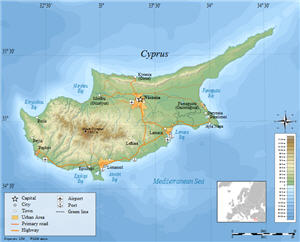What The Banking Crisis In Cyprus Means For Gold
The following guest post is from Steven Feldman, who is the CEO of Gold Bullion International.

What did Cypriot banks do with these deposits? They made all sorts of loans in Greece. Loans that don’t look so good now, and could cause a collapse of Cyprus’s banking sector. And that would result in massive losses to depositors.
To the Rescue…Government??
To remedy this unfortunate situation, the IMF, ECB, and EC proposed a $15 billion aid plan that required $8 billion of cash as collateral. In order to raise the collateral, Cyprus’s leaders have proposed a “tax” (read “confiscation”) of 6-10% on all deposits, depending on the size of the account. Apparently, this seemed like a good idea to Cypriot politicians. After all, wouldn’t depositors rather lose 6-10% of their account balance instead of a much higher percentage if their bank and/or banking system collapsed?
No.
Remember, not all the deposits were from offshore investors. Some were from average citizens of Cyprus. Citizens who, just like you, deposit their hard-earned money in bank accounts and fully expect to be able to withdraw their money, at will.
They didn’t make bad loans. Why should they pay? To the average Cypriot saver who never made any loans to Greek borrowers, it feels like plain old theft.
Indeed, their immediate response was outrage. People took to the street in protest. Others ran to the ATM to get their money out of harm’s way. Soon the ATMs were empty or closed. Banks have closed their doors, and businesses have no access to their money. And when the banks do open, there is a question mark as to how much cash will remain on hand. Capital controls will likely be put in place, restricting the movement of cash after the banks reopen.
Can you imagine the reaction in the United States if TARP had been funded by a 6-10% tax on bank deposits? As a coincidence, the math is just about correct. I can barely conjure up what the manifestation of that outrage would look like – everything from peaceful protest to full-on riot.
Of course, that did not happen. Instead, the Fed embarked on a zero-interest-rate policy that forced interest rates on bank savings to virtually zero. At the same time, core CPI may have been benign but did not remain zero (and other, seemingly more objective measures of inflation by non-government agencies show meaningfully higher inflation).
Using only core CPI and average pre-tax deposit rates on savings accounts at commercial banks, US depositors have lost more than 11% (uncompounded) of their purchasing power since 2008 – and a lot more than 11% against other major currencies and gold. That’s more than $500 billion in lost purchasing power. The amount spent on TARP was $430 billion.
We all know that core CPI means very little in the daily course of living. If we use other methods of calculating inflation – methods that include little things like food and energy – the loss in purchasing power equals a staggering 32%, or $1.45 trillion.
But where are the peaceful protests? Heck, where are the riots???
The complacency is astonishing and can only be explained by a quirk of cognitive behavior – most people are not equipped to deal with dangers that occur slowly.
So when you hear a friend comment about the Cyprus situation and they say, “It can never happen here”, tell them the unfortunate truth: it already did.
Steven Feldman is the CEO of Gold Bullion International (GBI). GBI has partnered with the Hard Assets Alliance to bring individual investors the ability to buy, sell, and store their precious metals across the globe, all through an innovative online trading platform. Learn more at www.hardassetsalliance.com.
Disclaimer
The Hard Assets Alliance website and the SmartMetals Investor are published by Hard Assets Alliance, LLC. Information contained in such publications is obtained from sources believed to be reliable, but its accuracy cannot be guaranteed. The information contained in such publications is not intended to constitute individual investment advice and is not designed to meet your personal financial situation. The opinions expressed in such publications are those of the publisher and are subject to change without notice. The information in such publications may become outdated, and there is no obligation to update any such information.
Any Hard Assets Alliance publication or website and its content and images, as well as all copyright, trademark, and other rights therein, are owned by Hard Assets Alliance, LLC. No portion of any Hard Assets Alliance publication or website may be extracted or reproduced without permission of Hard Assets Alliance, LLC. Nothing contained herein shall be construed as conferring any license or right under any copyright, trademark, or other right of Hard Assets Alliance, LLC. Unauthorized use, reproduction, or rebroadcast of any content of any Hard Assets Alliance publication or website is prohibited and shall be considered an infringement and/or misappropriation of the proprietary rights of Hard Assets Alliance, LLC.
Hard Assets Alliance, LLC reserves the right to cancel any subscription at any time. Cancellation of a subscription may result from any unauthorized use or reproduction or rebroadcast of any Hard Assets Alliance publication or website, any infringement or misappropriation of Hard Assets Alliance, LLC’s proprietary rights, or any other reason determined in the sole discretion of Hard Assets Alliance, LLC.